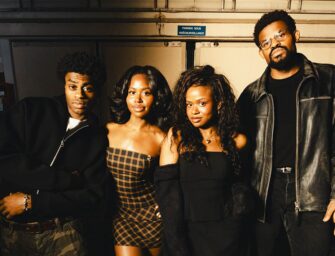
Hailey Whitters: “I don’t consider myself a protest songwriter, I’m trying to be more of a documentarian.” Photo: Harper Smith
The country star returns to her roots in order to make sense of her journey from the Midwest to Nashville
Raised feels like the prequel to The Dream in a way. The Dream was very much about where I was at the time in my life, about my Nashville experience, 12 years in a 10-year town. Raised feels like going back to the girl before Nashville; what inspired her, what encouraged her to move nine hours away from everything she’d ever known and try and pursue country music.
I think you can hear the music that I was raised on in these songs. The topic matter is growing up in my tiny town in the Midwest, it’s the people and the places that inspired me to try and pursue country music. I hope you get a little taste of that girl in this record. It’s obviously very Midwest focussed because that’s where I’m from and that’s where I grew up. But I think and hope, as far as being able to look back fondly on your childhood and remember some of the good moments, that there’s a universal element for everyone. Hopefully, you’ll look back and have a very positive experience of where you grew up and the people that shaped you.
AD ASTRA PER ALAS PORCI
During quarantine, my producer Jake Gear had composed this classical piece. He called me in to play it for me and he was like, ‘Hey, listen to this piece I just wrote, I think it’s really cool.’ I listened and it moved me to tears. It felt so cinematic and he was like, ‘What if we open the record on this?’ When he was writing it, it felt like a movie trailer or an opening scene of a movie. So he said ‘What if we set it as the opening scene for your new record?’
We called it Ad Astra Per Alas Porci which means, ‘To the stars on the wings of a pig.’ It’s a little inspired by John Steinbeck, who’s one of my favourite authors. That’s how we got the idea for my independent label Pigasus at the time, it was that Steinbeck-inspired kind of thing. This is an ode to the impossible. It’s an ode to my label Pigasus and it has that dreamy, whimsical feeling of, ‘To the stars on the wings of a pig.’
RAISED
Raised was one of the very first things that was written for this record. At the time, I definitely didn’t think it was going to be a title track. I wrote it with Nicolle Gaylon and Forest Whitehead. I had this title, Raised, and I like this song a lot. It’s a love song but it also feels like a love song to where I come from and it’s about being proud of where you come from. It’s actually the only love song I have on the record, but it shows a little more of that kind of tender, sweet side. I like it because it sets the tone on this sweet, optimistic note.
EVERYTHING SHE AIN’T
Everything She Ain’t was written with Ryan Tyndell and Bryan Simpson. We were sitting around the room and we were on some kind of dark Spaghetti Western idea. I guess I just wasn’t having it that day – but I’m now thinking we should go revisit that idea as it sounds really cool. I remember halting that idea and being like, ‘Can we write something light and catchy?’ Literally, they were like, ‘Okay, do you have a title or a line?’ And I remember saying, ‘What about, I’m everything she is and everything she ain’t?’ They were like, ‘Alright, let’s write that.’
For this one, I think there was a muse in the room that day. I don’t know what happened but we wrote this light, catchy little tune about the girl next door, who’s got it all and who’s telling this guy, ‘I can be what she is and I can be more, so pick me!’
BIG FAMILY
I wrote this with Cameron Bedell and Nicolle Galyon. Everyone has their crew in Nashville, and people are always asking me, ‘Who’s your writing crew?’ I’ve never really felt like I had a writing crew. I write with a lot of different people in town and I like that because it opens up the potential to have more diversity in my songs and in my songwriting; to hear different things from different sides. I kind of love that. This one, it was our first time, the three of us getting together. We’d never done that combo before.
I come from a very big family. We joke that – growing up in my hometown – I had more cousins than I did friends. I was always hanging out with my cousins. My mom and dad are both one of nine, my grandpa’s one of 15, and we’re all very close. We spend every Christmas and lots of the holidays together. Growing up, we used to have Sunday suppers. Every single Sunday everyone would go to my great grandpa’s house, he’d be sitting on a barstool drinking Schlitz and a shot of whiskey. He had an accordion and it was the opportunity for everyone to get together after church, make a big meal and sit around all day.
I think that was a very rare and lucky thing that I got to experience growing up. My Aunt Tina likes to throw back a few bottles of wine and get nice and wine drunk. She’s very happy that the song name-drops her.
MIDDLE OF AMERICA (feat. American Aquarium)
I wrote it with Bobby Pinson. I’m a big fan and love his songwriting so much. I had the title but it was a quarantine song so we wrote it via Zoom in 2020 and I love the way it turned out. This is a song that I’d had these half-baked verses on. Driving through Iowa I’d see a lot of eminent domain things happening, people getting their farms taken away from them. Generations of these family farms and the government’s taking them. It felt so wrong to me and I had that line, ‘State wants an airport they’re taking the farms’ bread and butters off the table, we’re all up in arms.’
That was the shell of what I had for the song. I didn’t entirely know what it was yet. I had the title Middle Of America and thought maybe they were of the same song. I took it to Bobby and he helped me finish it and really brought some new lines and depth to the song. I don’t consider myself a protest songwriter, I’m trying to be more of a documentarian and then people can have their own views about the songs.
We didn’t get to record together because BJ [Barham] was in North Carolina. So we weren’t in the studio together, but I think his performance elevated the energy of the song. It took it to where it really needed to go. I’m so glad he’s on it. When it was just me, I was like, ‘This is kind of a snooze. I think that we need somebody else on this song.’ BJ’s performance is so great and raw, and you can feel the energy on it. We’re playing the Ryman together in June, I hope that we get to perform that because I would love to get to do that with BJ.

Hailey Whitters: “Some of the brilliance of being a songwriter is that you can tap out of your gender a little bit.” Photo: Harper Smith
PLAIN JANE
I walked into that write and Cary Barlowe already had the track to Plain Jane – that very dark moody Jolene-esque track. We then really leaned into it lyrically. One of my favourite lines in the song is, ‘I ain’t afraid to wear my flaws, it’s so last year to cover them all.’ I like that a lot because it’s really taking ownership of your baggage and the less glamorous parts of who you are, owning it and wearing it and not being apologetic about it.
I also like the nursery rhyme language and that hook, ‘I’m a little more messed-up Mary than plain-Jane.’ It feels like a little nursery rhyme. It also feels a little like Black Sheep off my record a few albums ago. It’s that whole, ‘Don’t hide who you are, own who you are and be it unapologetically,’ that feels like the Black Sheep anthem moment, in a way.
I think we wrote that in like 2019. I was doing a lot of label meetings at the time. Maybe it was another one of those industry things where the town was trying to change me and the industry was trying to change me. I’d had enough of that. I get so tired of being told that I don’t belong here in Nashville, so it’s that empowering moment of, ‘Keep doing you, keep being you and they’ll catch on later.’
COLLEGE TOWN
This was a Nicolle Galyon/Jimmy Robbins write. Nicole had been texting me for a while, she was like, ‘Hey, I have this title College Town, let’s write it.’ I felt like I already knew how that was gonna be written. It would be drinking beer, staying up late and all that kind of stuff. I really wanted to find some sort of angle or hook that took it out of that land and didn’t feel like a song that I knew before I’d even heard it. That hook, ‘They don’t teach you in school what you learn in a college town,’ reinvented the idea for me.
I was the first person in my family to ever go to college, to ever graduate from college. I love the storytelling in that first little verse, ‘She’s the first one to make it to a college town.’ You see a lot of that where I come from, this new generation that actually has the opportunity to go on to school and to further their education. I think that’s really cool. I like the storytelling element of this song, it feels very 90s. It’s not just about getting drunk and waking up on a couch, although that is in the song, it’s more about what goes on in those four years.
The second verse is so smart to me. That was Jimmy, ‘She’ll come home for Christmas and cut off her hair/got a whole new opinion her parents don’t share.’ I know her, I was that girl. I came home from college thinking I knew everything, that I was gonna change the world and that my parents didn’t know anything. They put me in my place a little bit but I think that girl in the song, I’ve definitely been her and I know what that feels like.

Hailey Whitters: “I get so tired of being told that I don’t belong here in Nashville.” Photo: Harper Smith
INTERLUDE
This actually came about very organically. When we recorded Boys Back Home, we were in the studio with Mike Rojas who played keys and Pat McGrath who plays guitar. We were in between songs and they were playing around, riffing off each other. It was so moving that it caught my attention and I was like, ‘Someone hit record.’ I needed to capture whatever they were doing as it was making me feel really emotional.
We recorded it and I told my producer, ‘That has to go on the album.’ I remember him saying, ‘We should think about cutting that as it’s really long.’ But I was like, ‘No!’ It sets the scene for Boys Back Home and, every time I hear it, it brings me to tears. It feels very nostalgic, very anthemic in a way, and it’s something I felt had to be in there.
BOYS BACK HOME
Boys Back Home came from thinking about those boys. They were such a big part of my high school years. I got my first kiss from a boy that had a fat bottom lip. On Friday and Saturday nights, we’d pile into the back of one of their trucks, someone would pick up a bottle of cheap Hawkeye vodka, and, having told all of our parents that we were spending the night at each other’s house, we’d drive out to the woods and stay up all night.
We’d camp and we’d sit around a fire listening to Alan Jackson and Kenny Chesney and all that 90s/early 00s country. We’d stay up drinking and talking and hanging out. So on this song, I was thinking about those boys. They’re like brothers to me; whenever you go home they’re gonna take care of you and they’ve got your back. They taught me to stick up for myself and take no crap. I wanted to celebrate them a little bit.
EVERYBODY OUGHTA
I didn’t write this song and it’s the only song on the record that’s an outside cut. It’s Matt Roy and Craig Wiseman. I love cutting outside songs, absolutely. There are so many great songwriters in this town who can write a song better than I can. I’m definitely not afraid to cut an outside song, I think more people should do it.
It’s one of those songs that, when I heard it, I thought, ‘Man, I wish I wrote that.’ That’s kind of my bar for deciding when to cut an outside song, is it something that I feel like I could have said or wished that I had said? It naturally felt like a part of the project and it was kind of a no-brainer when we decided to cut it. I hope that I did the song justice in a way that the songwriters will like.
PRETTY BOY
I’d had this title Pretty Boy and it got me thinking about some of the elements of toxic masculinity back where I come from in rural America. You know, boys aren’t supposed to cry, boys are supposed to be tough, and I felt for those boys. I have three brothers and a lot of men in my family, very strong men. But I remember my dad saying at one point, ‘Vulnerability is what makes a man strong.’
I see some of the ways that the boys where I come from can be raised, and I do think there’s a balance there, but I also want boys to know that it’s not your muscles or how many girls you’re sleeping with that makes you tough. I wanted to tell them that it’s okay to be vulnerable.
Some of the brilliance of being a songwriter is that you can tap out of your gender a little bit, it’s more about chasing that universal feeling. I don’t know if Tom Douglas or Scooter Carusoe were thinking, ‘How would a girl sing this?’ As a writer, I’m never really thinking, ‘What would a girl say?’ Or, ‘What would a boy say?’ It’s more, ‘What does anybody say about that?’ To me, what makes songs universal is taking them out of their boxes and letting their words exist for anyone.

Hailey Whitters: “What makes songs universal is taking them out of their boxes and letting their words exist for anyone.” Photo: Harper Smith
THE NEON
I’m such a fan of Lori McKenna’s songwriting, so I don’t think, ‘How can I make this sound more like Hailey?’ But I think that Rodney Clawson brought out some different elements in us, because Lori and I can be very similar in the way that we put music to a song. Rodney was the outside influence, so if this song sounds different to a typical Hailey/Lori song, it’s because Rodney was in the room with us that day.
THE GRASSMAN
My grandpa had a sod farm growing up back in the 70s and he called himself “The Grassman”. He grew sod but everyone in our town called him up looking for pot. So he made his business motto “Whitters Turf Farms, Our Grass Is Legal” – I thought that had to be in a song somewhere.
It kind of feels a little like a modern-day Okie From Muskogee. It’s preserving some of those things that make people 110 percent Midwestern. That’s actually my Aunt Cindy on the recording. She used to answer the phones for him and that’s an imitation of what it was like when someone would call her asking for pot.
OUR GRASS IS LEGAL
I wrote this one day, I felt inspired to write that title. I wrote it and, before I knew it, it was done. So I didn’t have a co-writer. You definitely feel a little extra ounce of pride when you write a song by yourself, not because it’s good or not but because you actually finished a song.

Hailey Whitters: “I learned how to drive in a field, I used to go out skinny dipping with the boys in high school, we used to go out streaking and drinking beer in the field, and I got engaged in a field.” Photo: Harper Smith
BEER TASTES BETTER
Lori and I were face-to-face on Zoom. I had the title floating around and I feel like it came out so well. Seeing the title, you might roll your eyes and think this is a commercial bro-country song, but to me, it’s more than that. It’s about the nostalgia of going back to your hometown, everything’s changed but it kind of hasn’t. It’s appreciating where you came from and celebrating it. I go to my hometown bar every time I’m back to catch up with old friends and have a beer together and it’s this bittersweet thing.
That chorus came out of nowhere, ‘Shooting the breeze, old memories down…’ and it very quickly started to lean on to that more nostalgic element. One of my favourite lines in it is Lori’s line, ‘Bobbie’s little sister is a bartender now/ she’s got a couple of kids.’ When Lori spit that out, we quickly knew it wasn’t going to be your stereotypical down-the-middle song about beer. You know, there’s more to that story there than, ‘Let’s get drunk on a Friday.’
IN A FIELD SOMEWHERE
I wrote this song with Bryan Simpson and Jeff Hyde and I had that title In A Field Somewhere. I grew up in a field, and all those vignettes in that song are all true: I learned how to drive in a field, I used to go out skinny dipping with the boys in high school, we used to go out streaking and drinking beer in the field, and I got engaged in a field. So those are all very true vignettes of my life. This song feels very rootsy and very organic. It feels like a hymn to the heartland.
We cut it pretty close to the demo, it was pretty much already the way that it came through. It didn’t need much more, it was about telling that story. It felt like the right note to end the record on. I mean, that last verse is, ‘When I die, lay me down in a field somewhere,’ and I can feel my heart being called back to those fields all the time when I’m here in Nashville. Whenever I go home, I take a beer to the field out behind my parents’ house, sit in a lawn chair and soak it up. It’s kind of a holy place to me.
So that’s my new album Raised, which left me wanting to move back to Iowa. I tend to paint a more romanticised version of where I come from, maybe that’s because I haven’t been there in 14 years. I look back on that time and I feel very fond of it; of that place and of the people that raised me. We can’t get to who we are without realising where we come from. This record is me embracing that and celebrating it, realising that’s what made me who I am and is why I’m still here in Nashville. I hope it makes people feel good or be able to look back on their own raising and remember it somewhat fondly.

































Related Articles